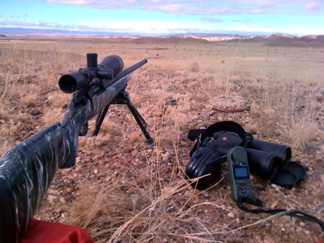

 The Accurate Reloading Forums
The Accurate Reloading Forums  THE ACCURATE RELOADING.COM FORUMS
THE ACCURATE RELOADING.COM FORUMS  Rifles
Rifles  Long Range Shooting
Long Range Shooting  30.06 for long range hunting
30.06 for long range huntingGo  | New  | Find  | Notify  | Tools  | Reply  |  |
| One of Us |
I'll add: 87.3% is the platform (gun and scope) 22.7% the cartridge, load and accuracy and.... 100% the shooter!!!!! You cannot BUY accuracy. It has to be earned! Buy, range, dial and shoot is a myth when it comes to long range shooting! Zeke | |||
|
| One of Us |
Just answering your question I would recommend something in the 180-200 grain range with a G1 bc of .575 or better OR a G7 near .300. For the ranges indicated, you want to strongly consider a 2 component max bullet. Every component adds a +/- variant and they add up creating inconsistent bullets that will create issues at those ranges. An example is Berger bullets. Lead plus a jacket designed for what you are doing. 2 components. There are others. Beyond your question: the musical instrument does not make the musician. You have to study the science, you have to dry fire extensively. You have to learn to shoot in field conditions. You need to understand all the variables that effect bullet flight from a scientific point. Then you need to learn the “art” part of shooting, and that is WIND or more likely, WINDS and their effect near, midrange and far. The only way I learned winds was by doing it after taking several mountain shooting classes. I learn more about winds every year. Brian Litz is as good a place to start the journey as anywhere else. My personal rule is that I never shoot at live game beyond 500. I do 90+% of my live fire target shooting beyond that out to the transonic range for my loads. | |||
|
| One of Us |
With premium bullets like Swift, Nosler and Trophy bonded as examples, the 30-06 cartridge is now at the performance level of the 300 H&H properly hand loaded. Current powders really do the business. I have more of an affinity for closing the distance to game animals, but sometimes with elk or mountain sheep one has a narrow window of time or distance. Then you need a rifle that you know and trust. My three 30-06 rifles include 2 pre-64 Model 70s and a custom Mauser in 30-06 Ackley Improved. One of the M-70s is an early Featherweight that features a Neidner-styled custom stock with checked steel butt plate and matching skeletal grip cap. That said, most moose, elk and deer have been taken under 150 yards. I treat my 30-06 rifles like they are 30-40 Krags and it sure works well. It's called stalk or still hunting. Avatar | |||
|
| one of us |
Love the 06, but Im a hunter not a shooter and 90% of mybig game hunting is 100 to 250 yards with a center body shot hold..I love the sneek part..I was a shooter at one time, then changed at some point!! I found the first 200 or so yards of a 400 yard shot is easy most of the time. Ray Atkinson Atkinson Hunting Adventures 10 Ward Lane, Filer, Idaho, 83328 208-731-4120 rayatkinsonhunting@gmail.com | |||
|
| one of us |
When it comes time to fire the shot the hunting is done with the shooting begins | |||
|
| One of Us |
In the end, impact velocity, bullet construction/ weight, and the animal will dictate how far you can shoot at an animal regardless of skill and equipment. | |||
|
| One of Us |
After attending the SAAM school at FTW Ranch, I think the .30.06 and other boring calibers are fine for long range shooting. If you are looking at competitive shooting, there are some choices that shoot flatter or higher BC bullets, but what I learned that out to 700 yds, all of the modern hunting cartridges are fine. There were 2 ladies in my class that were compete novices. At the end of the first day they were ringing the 700 yd steel with 6.5 Creedmore in Blaser R8 set up. Caliber and platform are mportant in that you need to know your “tool” but after that it is about the shooter. Wind is a big deal but having a spotter was very helpful I learning to judge wind. I never got good at it but learned to try and then adjust. Good luck | |||
|
| one of us |
This post will create clashing of teeth but based on observation of a number of instances I noticed the worst shots missed 99% of the time, so no problem. The well trained experts seldom missed but tended to wound and never a miss,, and without my dog, would not have retrieves the animal, broken legs and low gut shots.. On my ranch hunts for deer and antelope, No long range shots over 300 yards were allowed, Elk beyond 400 yards usually required at least sneaking as much as reasonable. Those were the rules like it or not, nobody complained as I recall which says a lot for most American hunters. Ray Atkinson Atkinson Hunting Adventures 10 Ward Lane, Filer, Idaho, 83328 208-731-4120 rayatkinsonhunting@gmail.com | |||
|
| Powered by Social Strata | Page 1 2 |
| Please Wait. Your request is being processed... |
|
 The Accurate Reloading Forums
The Accurate Reloading Forums  THE ACCURATE RELOADING.COM FORUMS
THE ACCURATE RELOADING.COM FORUMS  Rifles
Rifles  Long Range Shooting
Long Range Shooting  30.06 for long range hunting
30.06 for long range hunting

Visit our on-line store for AR Memorabilia

